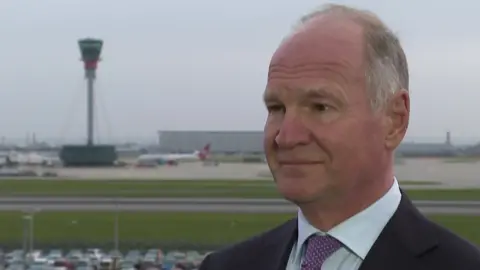**Heathrow Executives Express Frustration Over Oversight During Emergency Fire Incident**
The Chief Executive of Heathrow, Thomas Woldbye, has expressed considerable frustration regarding his sleep during a critical fire incident in March, which ultimately led to the airport’s closure and the cancellation of approximately 1,300 flights. The fire originated from an electrical substation near the airport, disrupting operations and affecting around 270,000 passengers. In a candid discussion with BBC’s *Today* program, Woldbye commented on this distressing event, indicating that it was not typical for him to miss significant alerts during such emergencies.
Woldbye’s admission sheds light on the unique circumstances surrounding the incident, noting that operationally, all necessary actions were taken despite his personal oversight. “It’s not how I normally operate,” he stated, reflecting on the situation. His concern was compounded by the extensive financial implications that arose—a loss estimated to cost the airport “millions.” However, Woldbye refrained from providing a specific figure for the estimated losses.
Following the incident, a review headed by former Transport Secretary Ruth Kelly uncovered that Woldbye missed multiple emergency notifications and phone calls on the night of the fire due to his mobile phone inadvertently being set to silent mode. This crucial oversight meant that vital information regarding the ongoing crisis was not relayed to him until around 6:45 AM, hours after the situation had spiraled out of control.
The timeline of events reveals that in the early hours of March 21, Heathrow made the difficult decision to suspend operations entirely. Despite being out of the loop initially, Woldbye proclaimed satisfaction with how the crisis was managed once he was informed. He asserted, “Of course, an organization like ours has to be able to manage whether the captain’s on the bridge or not,” further reinforcing confidence in the team’s capacity to respond effectively even amid a leadership vacuum.
As investigations unfolded, it was determined that the fire at the electrical substation was linked to a known fault that had been documented since 2018. Unfortunately, National Grid, the entity responsible for the substation, had not rectified the problem, leading to considerable concerns regarding safety protocols and operational integrity. The ongoing failure to address this issue has raised questions about the preparedness and accountability of the organizations involved in ensuring airport operations.
In light of the findings, Heathrow’s management has hinted at the possibility of pursuing legal action against National Grid due to the aforementioned negligence leading up to the fire. This upcoming legal justification demonstrates an inclination to augment safety measures and enforce checks against organizational lapses that might impact passenger safety and operational reliability in the future.
The repercussions of the March incident were illustrated in Heathrow’s financial outcomes, revealing a sharp 37.2% decrease in pre-tax profit, which fell to £203 million in the first half of 2025. This significant financial downturn underscores the cascading effects of operational disruptions, revealing the broader implications of seemingly isolated incidents.
As Heathrow continues to navigate the aftermath of this significant event, the leadership’s acknowledgment of shortcomings and commitment to improving their crisis management protocols will play a crucial role in restoring public confidence in the airport’s operational integrity. The inquiry’s revelations not only spotlight the challenges faced by modern transportation hubs but also serve as a reminder of the necessity for robust communication and swift response systems in crisis situations. Consequently, the incident has triggered discussions about regulatory policies governing safety and reliability in one of the world’s busiest airports.












